Head injuries are one of the most common types of damage, ranging from mild to severe. However, even a mild head injury can be painful, and taking them seriously is essential. Unfortunately, many people ignore head injuries because they think they’re not severe or don’t want to deal with the hassle of getting medical treatment.
According to the Centers for Disease Control and Prevention (CDC), head injuries are responsible for about 2.8 million emergency room visits yearly. Of those visits, nearly 50,000 resulted in death. Many of those deaths could have been prevented if people had sought medical treatment when they first noticed a head injury.
Some common signs of a head injury include:
- Headache
- Dizziness
- Nausea
- Vomiting
- Blurred vision
- Confusion
- Difficulty speaking
- Loss of balance or coordination
- Seizures
If you experience any of these symptoms after hitting your head, seek medical treatment immediately. Head injuries can sometimes lead to life-threatening conditions like brain hemorrhage or concussion. Here are a few steps to consider if you think you or someone else may have a head injury.
The RICE Method
If you’ve hit your head and are experiencing pain, the RICE method can help. RICE stands for rest, ice, compression, and elevation.
- Rest: Avoid any activities that may aggravate your pain.
- Ice: Apply a cold compress to the area for 20 minutes.
- Compression: Use a bandage or scarf to wrap the injured area lightly.
- Elevation: Prop up the injured area to reduce swelling.
The RICE method can help to relieve pain and swelling from a head injury. Most people utilize this method until the pain subsides, usually within a few days. However, seeing a doctor is essential if your symptoms don’t improve or if you experience any new symptoms.
Go to the Emergency Room

You can ask any hospital, and they will all answer the same: head injuries require emergency medical attention. Emergency rooms are designed to handle head injuries, so they’re the best place to go if you think you may have one.
The ER will conduct a series of tests to determine the severity of your injury and whether you need further treatment. These tests may include a CT scan, MRI, or X-ray. Once the ER has diagnosed your head injury, they’ll provide you with the appropriate treatment. Sometimes, this may mean being admitted to the hospital for observation or more intensive treatment.
However, MRI machines can induce claustrophobia, and many people don’t like hospital visits. Fortunately, you can schedule an appointment with a clinic that provides upright MRI scanner procedures. This MRI is more comfortable and doesn’t require you to lie down, making it a good option for people with milder symptoms.
See a Doctor Even if You Feel Fine
Just because you don’t have any symptoms doesn’t mean you don’t have a head injury. It’s not uncommon. Head injuries can go undetected immediately after the initial trauma. That’s why seeing a doctor is essential even if you feel fine.
Some head injuries, like concussions, can have delayed symptoms. Concussions often don’t cause symptoms until days or weeks after the initial injury. So, if you hit your head and don’t have any pain or other symptoms, it’s still important to see a doctor.
They may want to conduct tests or observe you for some time to ensure that your head injury doesn’t worsen.
Preventing Head Injuries
The best way to deal with a head injury is to prevent it from happening in the first place. Here are a few tips to help you avoid head injuries:
- Wear a seatbelt when driving or riding in a car.
- Wear a helmet when biking, skateboarding, or rollerblading activities.
- Use safety gear when playing contact sports.
- Avoid walking or running in areas where you may trip and fall.
- Be careful when climbing stairs or using ladders.
Of course, there is no way to tell if or when you may suffer a head injury. However, following these tips can help to reduce your risk. Knowing a few first-aid techniques will also be necessary in case you or someone else suffers a head injury. The first few hours are crucial for head injuries, so acting quickly and seeking medical attention is essential.
This is why it’s essential to have a good health insurance plan. A head injury can be expensive to treat, and you don’t want to be stuck with a hefty bill. Ensure you understand your health insurance policy and what it covers before an accident happens.
The Bottom Line
Hitting your head can be a serious matter. If you think you may have a head injury, it’s essential to seek medical attention right away. And, even if you don’t have any symptoms, it’s still a good idea to see a doctor to be safe. Taking precautions to prevent head injuries is also important. Wearing a seatbelt, helmet, and other safety gear can help protect you in an accident.

